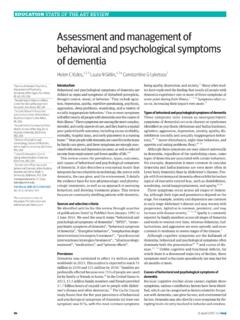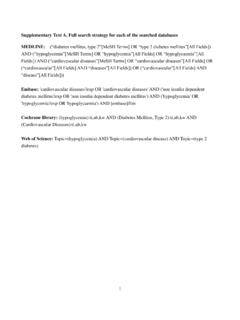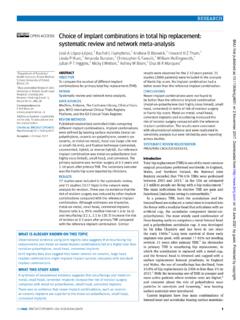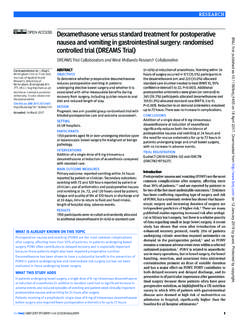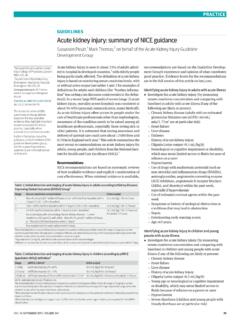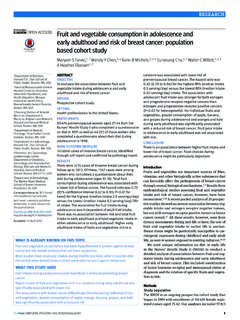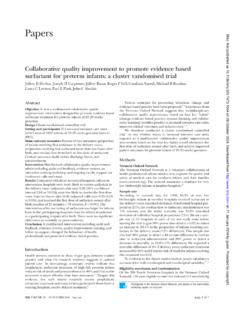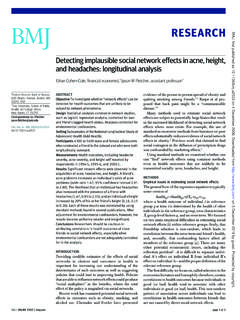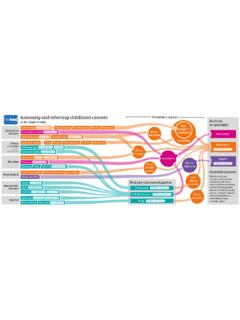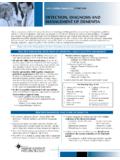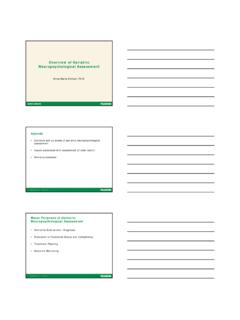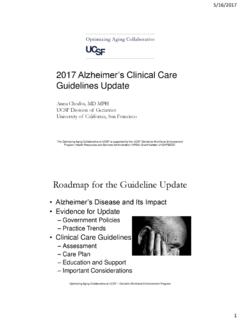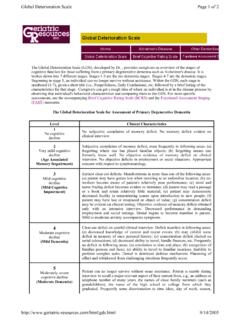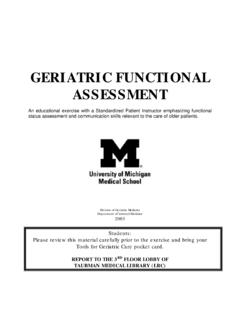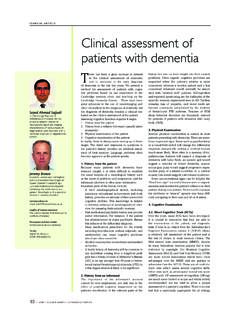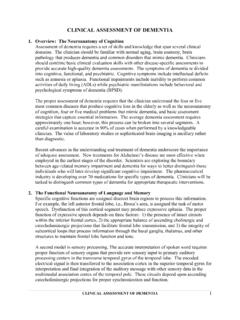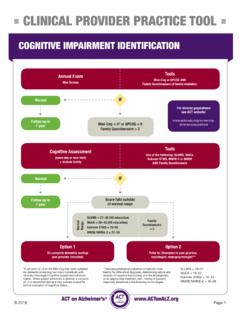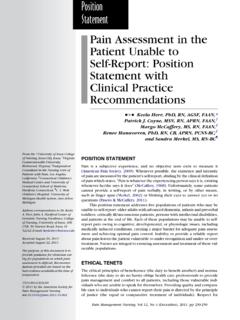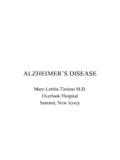Transcription of CLINICAL REVIEW Dementia - bmj.com
1 CLINICAL REVIEWD ementiaAlistair Burns,1,2 Steve Iliffe3 Dementiaisaclinicalsyndromecharacterised byaclusterof symptoms and signs manifested by difficulties inmemory, disturbances in language, psychological andpsychiatricchanges,andimpairmentsinac tivitiesofdailyliving. Alzheimer s disease is a specific disease entity andis the commonest cause of Dementia . In this, the first oftwo articles, we will REVIEW the CLINICAL and serviceimplications of Dementia syndrome; the second willconcentrate on Alzheimer is the burden of disease?About 12 million people worldwide have Dementia ,and thistotalis likelyto increaseto25 millionby UKreport2estimated that about 637 000people in the UK have Dementia syndrome and theannual cost of their care is 17bn ( ; $ ),which is more than heart disease ( 4bn), stroke ( 3bn),and cancer ( 2bn).
2 Annual costs per patient have beenestimated at $57 000 in the United States and $64 000in Italy (including estimates for informal care) and$24 000 in Sweden and $14 000 in Canada (excludinginformal care).w1 Dementia is one of the main causes ofdisability in later life; in terms of global burden ofdisease, it contributes of all years lived withdisability higher than stroke ( ), musculoskeletaldisorders ( ), heart disease (5%), and cancer( ).w2 The scale of the problem of Dementia , andthe under-response to it that is evident world wide, hasprompted governments to REVIEW their policies. Oneexample of the political pressure facing industrialsocieties can be seen in the arguments of the UK sAlzheimer sSociety (box1), whichhasbeen influentialin developing the Dementia strategy for are the barriers to making a diagnosis early?
3 The benefits of early investigation and diagnosisinclude identification of treatable physical andpsychiatric causes, treatment of comorbid conditions,initiation of psychosocial support, and instigation ofpharmacological symptomatic treatments. However,early recognition is not easy because of the insidiousand variable onset of the syndrome, which emergesthrough the personality of the individual, sometimeswithout a clear demarcation until late in the diseaseprocess. Patients, families, and general practitionersmay all be reluctant to diagnose Dementia because it issuch a serious and largely unmodifiable disease thatstill carries a huge burden of stigma.
4 Physicians mayunconsciously hesitate to label a patient as such,3andfamily members may gradually take over social rolesfrom the patient, protecting him or her from difficultiesindailylife,butalsodelayingt heconsciousrecognitionof the disorder by offsetting can clinicians recognise Dementia ?Recognitionofanemergingdementia syndromedepends on the triad of patient report, informanthistory, and assessment of cognitive that memory problems in old age,particularly when deteriorating and interfering withdaily activities, may be the harbinger of Dementia is themost important factor in recognition. The mostcommonly used cognitive assessment tool is the mini-mental state examination,5which is scored out of 30: ascore of <24 suggests Dementia .
5 However, perfor-mance requires intact language and is dependent oneducationalattainment andcultural up to 20 minutes to complete and so may bepractical for use only in secondary care. The generalpractitioner assessment of cognition test,6and twoother cognitive screening tests (the mini-cogBox 1 Seven recommendations from theDementia UKreport2 Make Dementia a national priority Increase funding for Dementia research Improve skills in Dementia care Develop community support Guarantee support packages for carers Hold a national debate on who pays for care Develop comprehensive Dementia care modelsSOURCES AND SELECTION CRITERIAWe searched Medline and Pubmed from 2006 to September 2008.)
6 Previous work havingbeen summarised in the joint Dementia guideline published by NICE and the Social CareInstitute for Excellence in 2006. We searched the Cochrane database (2008 version) forrandomised controlled trials for drug treatment and psychosocial interventions and of ManchesterPsychiatry Research Group,Manchester M13 9PL2 Manchester Mental Health andSocial Care Trust, Manchester3 Department of Primary Care &Population Health, UniversityCollege London, London NW3 2 PFCorrespondence to: A this as:BMJ2009;338:b75 |14 FEBRUARY 2009|VOLUME 338405 For the full versions of these articles see instrumentw3and the memory impairmentscreenw4) are as clinically and psychometrically robustas and more appropriate for use in primary care thanthe mini-mental state six itemcognitive impairment test (box 2) was designed foruse in general practice and produces more reliableresults than the mini-mental state is Dementia usually diagnosed?
7 Current UK guidance recommends that the generalpractitioner perform some routine investigations (stan-dard blood screening and possibly chest radiography ifthe patient has a history of chest disease andelectrocardiography if heart disease is suspected) beforereferring the patient for a specialist secondary careassessment, preferably by an old age step comprises the exclusion of potentiallyreversible conditions (such as normal pressure hydro-cephalus) and the confirmation of the Dementia pathol-ogy via detailed neurocognitive assessment and, ifavailable, computed tomography. This allows thesubtyping of Dementia that is important for prognosisand treatment, particularly given that some physiciansare reluctant to diagnose Alzheimer s disease, the onlyone of the dementias in which symptom modificationwith drug treatment is possible.
8 Box 3 summarises theinvestigations that should be diagnostic process may be iterative first symptom to presentation tothe general practitioner takes about 18 months, with asimilar time to diagnosis thereafter. This time periodcan be shortened by using a structured educationalintervention based on adult learning principles andconducted as a workshop in general practice. Thiseducational package can improve diagnostic rates ofdementia syndromes, as can decision support softwaredesigned to help diagnostic and curriculum for the educational inter-ventionhasbeendistributedasanelect ronictutorialonCD to all practices in England by the Alzheimer sSociety, and the decision support software has beenincorporatedintotheEMIS clinicalsoftwaresystemforgeneral can clinicians distinguish Dementia anddepression?
9 To diagnose someone with Dementia when in fact theyare depressed is traditionally taught as one of the greaterrors of CLINICAL practice. This rule was based largelyon the fact that depression is potentially treatable anddementia largely untreatable. What is now known isthatthecomorbidityofdepressivedementia symptomsis high. People with Dementia syndrome have highrates of depression and people with depression oftenhave prominent complaints of memory loss, neuro-psychologicaldeficits, addition, the fear of triggering a depressiveresponse, denial, or withdrawal from contact withservices is one factor that inhibits practitioners fromdiscussing Dementia as a treatments forspecific causes of Dementia emerge, the traditionaldichotomyofatreatableversusan on-treatableconditionis less relevant to CLINICAL practice.
10 But neverthelessawareness of the overlap between these disorders isclinically important because CLINICAL trials have shownthat antidepressant treatment can be is it important to determine the cause of Dementia ?Box 4 outlines the different causes (sometimes referredto as subtyping) of Dementia syndrome. The causes areimportantbecausedifferenttypesofdemen tiacanhavedifferent courses, with different patterns of symptoms,and can respond differently to treatment. For example,the symptoms of Alzheimer s disease can be modifiedBox 2 The six item cognitive impairment test*Six questions What year is it?
